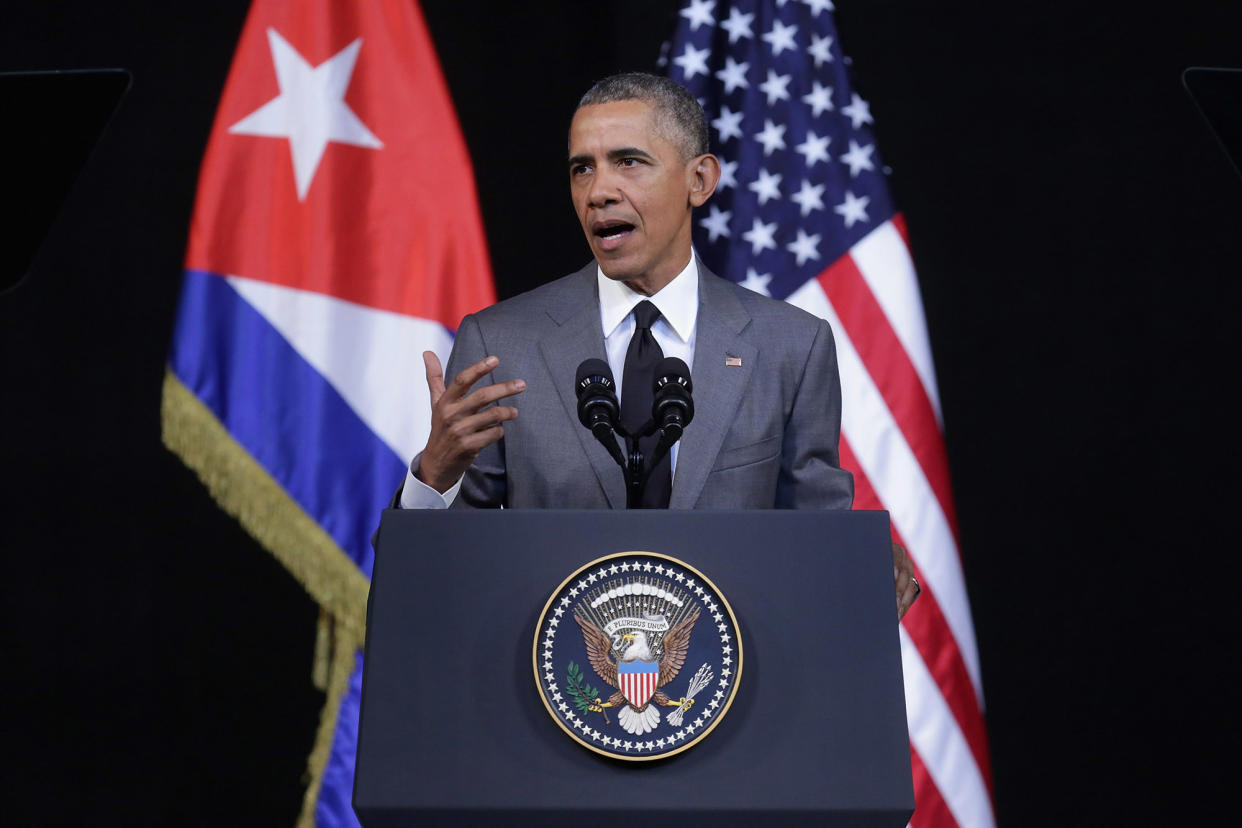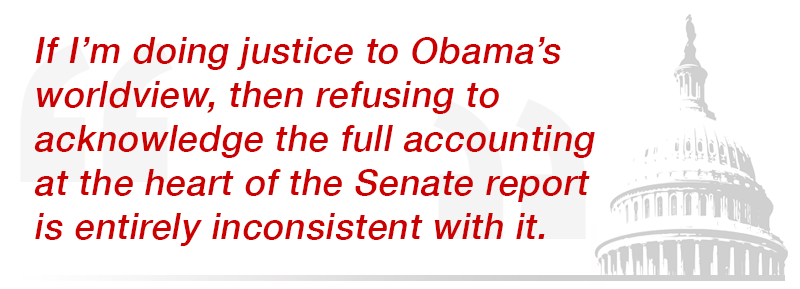What Obama should do on torture

Like a lot of two-term presidents nearing the last bend in the road, Barack Obama seems guided by equal parts conviction and whimsy these days, without much regard for political consequence. The president has expounded publicly on race and political civility, shaken hands with a Cuban Castro, commuted a slew of sentences for drug offenders, plunged the federal government into the debate over transgender Americans in restrooms.
He even rapped in the Rose Garden, which is the kind of thing his advisers would have endlessly debated a few years ago before deciding it was too perilous a move for the nation’s first black president.
But there’s at least one place where Obama has yet to square his actions with the principles he has long espoused, and he should add it to the list of to-dos he has slyly referred to as a rhyming-with-“bucket” list.
Obama clearly isn’t going to declassify the full text of the Senate’s mammoth, landmark report on torture, and maybe that’s the right call — I don’t know. But he can at least make his most senior officials read the damn thing.
Chances are you haven’t closely followed the twisting saga of the Senate Select Committee on Intelligence’s 6,700-page report (with 37,700 footnotes) on what America did in its secret prisons after 2001. (I wrote about it at one crucial juncture, but my Yahoo colleague Michael Isikoff has brilliantly chronicled the whole affair.)
Here are the basics, as I understand them. In late 2014, after lengthy negotiations between the two ends of Pennsylvania Avenue, the intelligence committee publicly released its executive summary of the report, the longest and most exhaustive in the history of legislative inquiry.
The CIA had openly denounced drafts of the report, which found that extreme interrogation measures actually didn’t achieve as much as other methods of intelligence gathering, that the brutality of those measures was often understated, and that the CIA had repeatedly misled officials — including two presidents — about the program.

At the same time as that release, and shortly before having to relinquish her chairmanship of the intelligence committee, California Sen. Dianne Feinstein — hardly known as a dovish Democrat — sent eight top-secret copies of the full report to the president and his top officials at the CIA, the Pentagon, Justice, the FBI and the State Department.
In her cover letter to Obama, Feinstein reminded the president of his own words regarding torture — that “we have to, as a country, take responsibility for that so that, hopefully, we don’t do it again in the future.”
Feinstein’s action ignited a long and arcane fight over whether the report, once in the possession of the executive branch, might be subject to freedom of information laws, which would mean you or I could file some papers and ostensibly get the full report, however redacted, mailed to our homes. The ACLU sued the government, insisting that the report should now be designated an executive record, preserved and subject to disclosure.
In their legal response filed last year, government lawyers said something pretty remarkable. They held, first, that the report couldn’t be considered an executive record, no matter how the administration handled it, because it was essentially borrowed from Congress, which isn’t subject to the same disclosure laws. (Don’t ask me why.)
But just in case a federal appeals court disagreed with that argument, the government disclosed that disks containing the report had been immediately deposited into vaults at the Justice, Defense and State departments, where they remained untouched and unread.
In other words: The only officials who’ve read the full report would seem to be those at the CIA, who are most inclined to dismiss it out of hand. Meanwhile, agencies that might actually draw some useful lessons from it — like the FBI and the Office of Legal Counsel at Justice (where Bush administration lawyers rendered multiple opinions, based on the CIA’s dubious information, that torture was legal) — have effectively treated the report like hazardous waste.
Theoretically they could have viewed the report on Capitol Hill, even while their own copies were under lock, but there’s no indication they have.
What has the government learned from the detailed case studies that are apparently at the heart of the fullest accounting on record of America’s dark descent into torture? Nothing, that’s what. Because it doesn’t appear anyone’s read it.
Now comes an interesting new development. Last week, the appellate court ruled against the ACLU, holding that the so-called torture report is not, in fact, an executive record and remains under congressional control, period.
This means the president could order senior agency officials to read the report and reflect on it without imperiling secrecy. He should, and here’s why.
Obama has made it clear that he does not consider Islamic terrorism to be an existential threat to the country, like the Soviet Union during the Cold War. Wrenching and profound as an attack like those of 2001 might be, it does not imperil American sovereignty or survival.

And yet, Obama thinks America’s reaction to this kind of crisis could pose a much deeper threat to the republic, should we ever become panicked enough to subvert our own values and constitutional protections. Obama would tell you, if he were being blunt, that savage attacks on American cities are survivable; willfully exploding the pillars of our democracy may not be.
And if I’m doing justice to Obama’s worldview, then refusing to acknowledge the full accounting at the heart of the Senate report is entirely inconsistent with it. Somewhere on that winnowing rhymes-with-“bucket” list, there must be room for an executive order that would force a handful of officials to read the full report and consider what their agencies might have done differently.
There’s cause for urgency here. Richard Burr, the North Carolina senator who succeeded Feinstein as chairman, has already asked the White House to return all copies of the report that Feinstein distributed. (Obama has thus far declined.) And last week, Isikoff reported that the CIA inspector general had accidentally deleted one of the copies and could no longer retrieve it.
All of this has open-government groups profoundly worried that the torture report could ultimately be the first of its kind to vanish completely before anyone in government even grapples with the entirety of it. Subsequent administrations could know more about UFOs in Roswell than about the CIA’s secret and sanctioned brutality.
If that happens, Obama’s legacy will be reshaped not only by what he did in his closing months, but also by what he didn’t.


